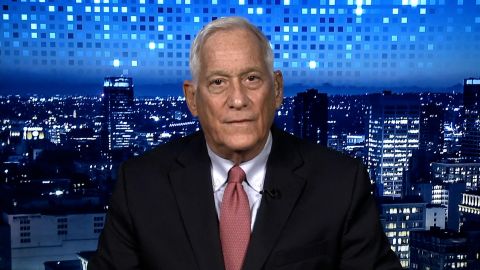Read Transcript EXPAND
BIANNA GOLODRYGA, SENIOR GLOBAL AFFAIRS ANALYST: Walter, we are so fortunate to have you join us to talk about Henry Kissinger. And let’s start there with the image that we saw with President Nixon, one of the United States most controversial presidents. And Henry Kissinger, one of the most controversial diplomats in U.S. history. On the surface, these two men couldn’t be more opposite. And yet, they somehow worked together in a synergy that few U.S. presidents were able to create with their advisers. Can you talk about how you explain that?
WALTER ISAACSON, AUTHOR, “KISSINGER”: You know, they reinforced in some ways the dark and conspiratorial minds that they both had. They were indeed totally different. Richard Nixon made all sorts of antisemitic remarks. Kissinger grew up Jewish in Germany and got out just before the Holocaust. And yet, they both had a sense of power. They were both very manipulative, and I think, because Kissinger worked for Nelson Rockefeller before. Had Kissinger ended up being an aide to a President Nelson Rockefeller, I don’t think he would have been as secretive and manipulative. But he and Nixon both reinforced each other’s dark side.
GOLODRYGA: And they both were attracted to power.
ISAACSON: Absolutely.
GOLODRYGA: Let’s also talk —
ISAACSON: And they understood power. I mean, they understood balance as a power, which was a thing that made them effective at times. The figuring out of a triangular balance between Russia and China and the U.S. So, that sense of power balance they got, it was — they did get the sense of American moral value that should underpin our foreign policy.
GOLODRYGA: And you hear it in the introductions, as we’ve been discussing here at CNN all day, his legacy, revered and reviled. You know, we’ve had several decades. The man lived to be 100, and yet, it’s still very, very complicating to describe him, right, even in one sentence. And you talk about the juxtaposition and the differing views among some of the world’s most influential leaders. Even on the passing — news of his passing, Tony Blair and his eulogy to Henry Kissinger said that he was motivated by genuine love of the free world and need to protect it. Now, compare that to what President Obama said to “The Atlantic” in 2016, we’ll put up the graphic here. “We dropped more ordinance on Cambodia and Laos than on Europe in World War II, and yet, ultimately, Nixon withdrew, Kissinger went to Paris, and all we left behind was chaos, slaughter, and authoritarian governments that finally, over time, have emerged from that hell. When I go to visit those countries, I’m going to try to figure out how we can, today, help them remove bombs that are still blowing off the legs of little kids. In what way did that strategy promote our interests?” Now, between these two descriptions and thoughts on Henry Kissinger, which one do you view, as his biographer, more closely aligned with the man himself?
ISAACSON: I think in the end, it’ll be a more problematic legacy, because he did think that great power diplomacy could affect this civil war, whether it was East Timor or Chile or Vietnam, Cambodian and Laos, he saw it all in the context of a great power struggle, as if he were his — one of his heroes, Bismarck or Metternich, one of the European foreign ministers, you know, in the 1800. And in the end, it caused a whole lot of civilian casualties that are tenfold the number that we’re seeing in the Middle East, a hundred-fold the number, and also, genocides, whether it was Laos, Cambodia, the bombings there, things that have been forgotten, like East Pakistan and Timor, all of these places go up in flames because Kissinger tried to put it into a framework of the superpower Cold War struggle.
GOLODRYGA: Yes. He was massively criticized for his actions in Cambodia bombing to eradicate the Vietcong forces there. He told the military to strike “anything that flies or anything that moves.” He’s been accused of genocide breaking international laws. Tens of thousands of civilians killed. Did he ever seem to express regret for his past actions, even if they were well intentioned in his mind, at least, to you?
ISAACSON: I think he expressed the sense that they had gotten it wrong. Clearly, if you look at Cambodia, that’s the worst. They did this, you know, secret invasion and then, the secret bombing of Cambodia, it was called, because. Kissinger operated great secrecy. But it was those secrets of the Cambodians, they were being bombed. I think, you know, hundreds of thousands of civilians were killed. And nowadays, we look at what’s happening in Gaza and other things, and we worry about civilian casualties, that was not on his radar screen. And when you come out of that, you end up with the genocides and chaos in Laos, Cambodia, all of Southeast Asia. So, he knew it didn’t work. I think he would argue that he was well intentioned, that it was to try to get us out of the Vietnam War. But certainly, somebody with his brilliant mind knows that it ended up being a really bad strategy.
About This Episode EXPAND
Influential former Secretary of State Henry Kissinger passed away this week at the age of 100. Walter Isaacson, author of “Kissinger,” discusses his legacy. Political commentators Margaret Hoover and John Avlon discuss the potential Biden-Trump rematch in 2024. Al Jazeera English correspondent Youmna ElSayed on the realities of being a journalist on the ground in Gaza.
LEARN MORE

